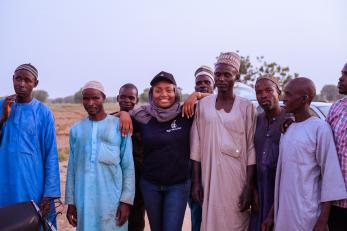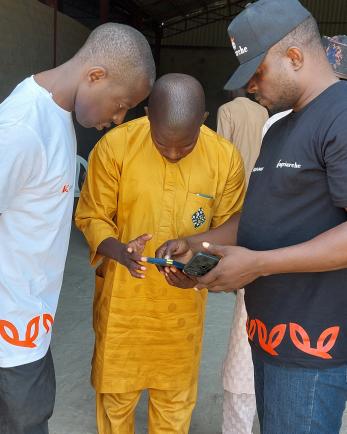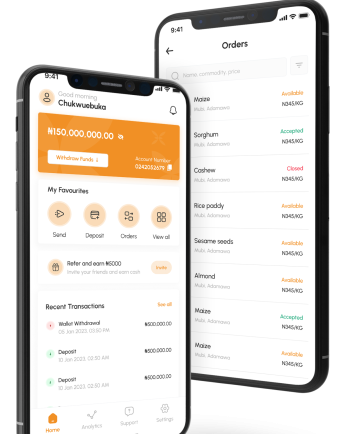Agriarche: Believing in farmers, digitizing last-mile agriculture market

“Someone had to bring sanity to the agricultural market in Nigeria”, says Deina Mayaki, a social entrepreneur, and a co-founder of Agriarche, an emerging agritech start-up changing the game in agriculture in Nigeria through digitization.
For Nigeria, a country with the second highest burden of malnourished children in the world, productivity increase in agriculture is a critical issue. In the rural Northeast of Nigeria, the reliance on agriculture remains particularly high as it forms the backbone of communities and livelihood. As the region suffers from a thin market due to the history of insurgency and instability, it is in dire need of a more efficient and connected agricultural market.
The USAID-funded Feed the Future Nigeria Rural Resilience Activity (RRA) partners with various key market players to combat the vicious cycle of poverty and hunger through innovative business models, especially in vulnerable, conflict-affected areas of Northeast Nigeria.
Implementers of this program, Mercy Corps, in partnership with the International Fertilizer Development Center and Save the Children International, empower and encourage market actors to expand their services in Northeast Nigeria to accelerate the growth in the agriculture sector, through co-investment and technical collaboration. Agriarche is one of the partners of RRA working to address the issue of inefficiency in the agricultural market, such as poor access to correct market information, limited connectivity between actors, mismatch of demand and supply, and high cost of transportation from the overuse of middlemen.
Deina says she has already had the flare for tackling challenges that people say are impossible to solve. “Before starting Agriarche, I worked with a FinTech company to introduce their product to rice farmers. Many assume that farmers are poor, but I saw them with drawers full of money to sponsor themselves. I knew that farmers would jump on opportunities if they were well presented ”, she recounts. “People, including farmers themselves and even my team members, did not believe in the potential of digitization”. Thus, Agriarche and its main service, “Kasuwa” were born. Kasuwa is an online platform that connects buyers and sellers of Agric commodities with a simple touch on the screen. It provides farmers and aggregators—agricultural businesses or cooperatives of growers that consolidate and distribute agricultural products—with access to wider markets and more buyers, transparency into the trade as well as market information, and even finance by providing trading history.
RRA collaborated with Agriarche to extend the Kasuwa App's reach to last-mile farmers and aggregators in Northeast Nigeria, maximizing the impact by supplementing the app with training in areas like good agricultural practices and storage technology to reduce post-harvest loss. This partnership also helped Agriarche build new aggregation centers to attract last-mile aggregators and connected Agriarche with various value-chain players in the Northeast through the Roundtable Dialogue Sessions, which became the groundwork for expanding the Kasuwa app's presence in the region. Deina says she was initially hesitant to expand Agriarche’s operations to Northeast Nigeria due to the insecurity. “Support from USAID and RRA came at the right time and with the right team. It gave us the confidence to expand in Northeast Nigeria,” says Deina.

Access to a broader customer base via the Kasuwa App has proven to be a source of transformative impact to many farmers and aggregators, particularly those engaged with rural communities in the Northeast. Adamu Mohammed Biri, a farmer, and an aggregator, is a prime example of someone whose life underwent a significant transformation with the introduction of the Kasuwa App.
Adamu used to face significant challenges when demand for his products was low. He engaged in the traditional practice of taking the aggregated agricultural produce to the market, where he sought direct contact with buyers or intermediaries.
Adamu recalls, “Before the Kasuwa App, you had to look for goods, supply goods to the market, and wait for customers.”
This approach meant that if he couldn't find a suitable buyer, he was forced to sell for a lower price or even worse, to go back without any sales. In the fragmented agricultural markets of Northeast Nigeria, unpredictable sales, high transportation costs, and post-harvest losses from untimely buyers were hurting producers and aggregators. Adamu, too, used to struggle to meet the needs of his family of 8, such as his children's school fees.
“I found it difficult to keep a good relationship with my children because I can't provide good food for them and also can't cater for some of their basic needs. Even the community's perception about me was bad because I owed some money to some community members and I didn't financially contribute to the community,” Adamu describes.
Adamu's turning point arrived when an Agriarche agent introduced him to the Kasuwa App. When asked about his transition to using technology, he expressed no difficulty in adapting to a new way of trading. “They say when the music changes, the style of dance should also change. We have been using traditional means of trade for a long time and now new developments have come, so I thought to myself since we are in the age of technology, let us try it and see”, Adamu says.
The decision to embrace the Kasuwa App turned out to be the right decision for them.
“Before I started using the App, I didn't think the App would make me develop like this within a short period of time. I make double what I make as weekly profit using Kasuwa”, Adamu excitedly shares.
“I now changed my children’s school for a better one. Apart from that, I am even helping some of my neighbors financially now. So really, all I can say is thank God”, Adamu describes his experience. As his market expands and exposes him to new customers, it has also exposed him to a new version of himself. He feels more courage to be himself and recognizes more potential within him, emboldening him to scale his aggregation.

Adamu is just one of the many who benefited from the availability of the Kasuwa App in the Northeast. With this partnership, Agriarche was able to connect over 800 new aggregators and more than 12,000 new farmers in the Northeast to a wider market through digitization. As a result, the Kasuwa App is now facilitating over 7 million USD worth of trade on its platform.
In Nigeria, the agriculture sector contributes to 24% of GDP, employing more than two-thirds of the employment. However, the sector receives only 3.8% of the bank loans and investments. Agriarche believed that there is still much to be done to digitize and increase efficiency in the agricultural value chains to attract more investment.
Deina tells us with a confident smile that small-holder farmers in Nigeria, just like Adamu are impacting the economy and feeding the nation. “If you do this for one community, how about all other communities we have in Nigeria?”